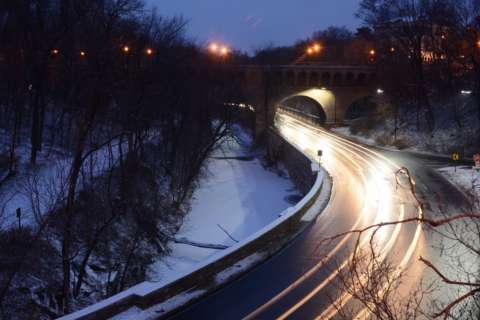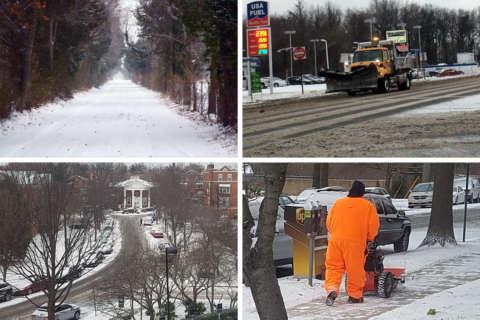WASHINGTON — Salt used to melt snow and ice on wintry roadways is contaminating Virginia groundwater, according to a new study.
“Road salt, while we put it on the roads, it’s got to go somewhere when it washes off the roads. It doesn’t disappear,” said Joel Snodgrass, head of Virginia Tech’s Department of Fish and Wildlife Conservation. “It actually goes into our groundwater.”
Snodgrass said current stormwater management practices stop some salt from getting into surface water — such as streams and wetlands — but far from all.
The salt can impact fish and wildlife there, he said.
“It also threatens our drinking waters supplies as it gets into reservoirs and groundwater that we use for drinking water,” he said.
Snodgrass and other researchers from Virginia Tech and Towson University studied how effective retention ponds in Baltimore County were at removing road salt from the water.
Retention ponds catch the water as it runs off parking lots and roads so the runoff doesn’t enter groundwater or surface water, such as ponds and streams. Basically, the retention ponds cleanse the water of pollutants.
But Snodgrass said the retention ponds didn’t work at all when it came to road salt. He said the ponds actually promoted the buildup of salt.
“In other words, we’ve gone from freshwater to seawater just by this salt building up under these ponds,” he said.
Snodgrass said the excessive salt has a negative impact on wildlife and humans. Fish and the wildlife face increased challenges of finding water to drink, he said.
The increased sodium is particularly a problem for people who have wells, because it can cause appliances to corrode more rapidly, he said. Increased levels of sodium can also be a problem for people on low-sodium diets, such as people with hypertension.
Overall, surface-water salt levels have been increasing for the past 30 years in Baltimore’s reservoirs, Snodgrass said. In part that’s because reservoirs are not currently designed to remove salt and the cost of a desalinization process is extremely expensive.
There’s no silver bullet to fixing the problem, Snodgrass said, but the goal is to move toward reducing the amount of road salt that is used.
In a statement emailed to WTOP, Virginia Department of Transportation spokeswoman Ellen Kamilakis said the department has been reducing the amount of road salt it uses.
“We continuously work to refine our practices in order to provide a transportation system that is safe, efficient and effective while reducing environmental impacts,” Kamilakis said in the statement.
“During winter weather events, VDOT must rely on proven snow and ice control practices” that include applying road salt, the statement read.
However, the department has also been ramping up the practice of pre-treating roads with a brine solution before snow falls, which has less chloride than traditional road salt.
“We will continue to seek the most innovative and creative practices to protect the environment and the traveling public,” Kamilakis said in the statement.






